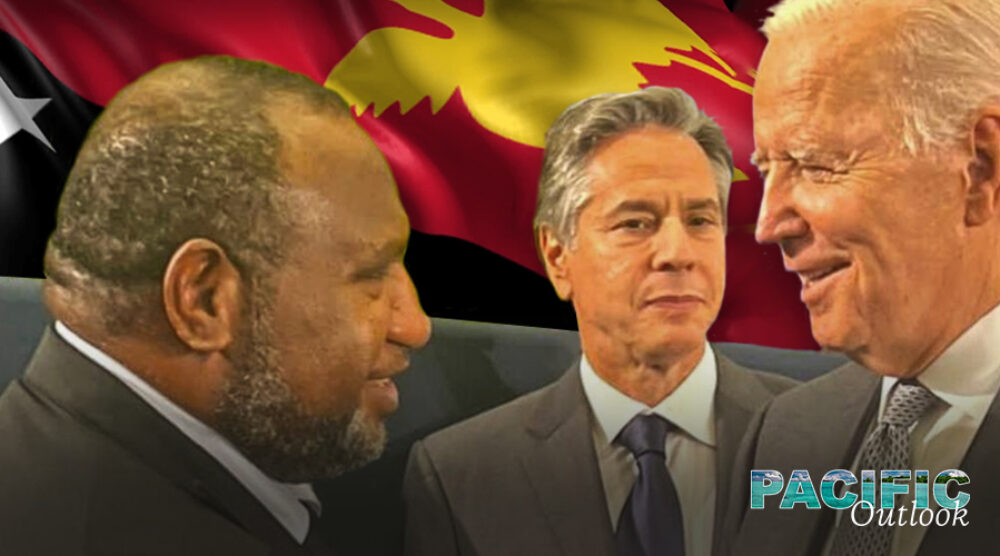The late US Secretary of State George Shultz noted that “diplomatic visits are an important expression of presidential priorities.”
Despite President Biden’s last-minute cancellation to Papua New Guinea (PNG), the significance of Secretary of State Anthony Blinken’s brief visit should not be overlooked, let alone the signing of the US-PNG Defense Cooperation Agreement (DCA) – an agreement that reflects not only a changing strategic atmosphere but PNG’s emergence, scale and its challenges and internal politics.
Indeed, while working with Port Moresby’s National Capital District Commission in 2010, I recall the fanfare of then-US Secretary of State Hilary Clinton’s whistlestop tour – the first of its kind – and noting PNG had not received any comparable senior US government leader since Douglas MacArthur in World War II.
Things have clearly changed. US Vice President Mike Pence attended PNG’s APEC 2018, signing the PNG Electrification Partnership (PEP) and a commitment for Lombrum Naval Base upgrades. This is now Blinken’s second visit to PNG and the wider Pacific islands region in under two years – an unprecedented level of focus among US Secretaries of State.
Certainly, PNG is clearly now on the strategic map and the DCA, while provoking concerns, is broadly reflective of two factors.
The first is an acknowledgement not just of priority but of PNG’s scale. At nine million people and growing fast, PNG is the largest of the Pacific’s 15 nations. The country possesses a range of internal challenges, from climate change displacement issues to law and order concerns. Its demographic growth, expanding economy and trade links are creating expectations on its strategic intent. The DCA is both an acknowledgement and a much-needed signal of this intent from the Marape Government.
The second reason is strategic. Beijing has strong links to PNG as a Comprehensive Strategic Partner – the highest form of China’s diplomatic relationship – and it has developed a range of hard in-country infrastructure projects, while also creating toeholds for potential future deliverables, as seen by the 2020 MOU for a fisheries facility at Daru – mere kilometres from Australian waters.
Biden brings PNG closer to the US, especially “in the midst of the most consequential strategic realignment since the Second World War” – to borrow from Australian policymakers – and Beijing, while putting forward a measured DCA response, will no doubt be concerned.
Within PNG, broader DCA-related issues have also been raised around creeping militarisation, the exemptions offered to active US personnel, and the wider disproportionate attention currently being paid to Beijing’s increasing security ties in the Pacific.
These are all valid. However, it is worth noting the nature of the DCA itself, which is fundamentally motivated by a “democratic partnership” between “like-minded democratic countries”. PNG, after all, is a ‘noisy’ democracy but a democracy, nonetheless.
Also worth acknowledging is the DCA’s context in the mix of other revamped US commitments, such as the US Pacific Partnership Strategy. Although a regional strategy, PNG-specific features include:
- Climate-Smart Infrastructure to enhance regional net-zero related goals and access for US private sector renewable energy firms. Also in parallel to this commitment is the Boosting Long-term U.S. Engagement in the Pacific Act (BLUE Pacific Act), which elevates “the countries of Oceania as a strategic national security and economic security priority.”
- Law enforcement training from the Federal Bureau of Investigation (FBI).
- Capacity building to fight cybercrime, from a total funding pool of US$1.6 million.
- Combating wildlife trafficking, from a total pool of US$3.25 million.
- An additional US$18 million for the PEP.
The DCA was also announced alongside an Agreement Concerning Counter Illicit Transnational Maritime Activity Operations, offering PNG unique training and enforcement capabilities in this respect, from illegal fishing to drug trafficking.
The sum of these measures illustrates both nations are thinking beyond strictly defence and traditional security ties in an attempt to enhance PNG’s state capacity. State capacity will be critical, especially in responding to and managing localised climate change impacts, which are consistently offered by Pacific leaders as the region’s top priority.
Finally, there will be a need, as part of the growing US-PNG relationship, to appreciate not just state capabilities but state politics as well. It is a small but noticeable irony, for example, that former PNG Foreign Minister Justin Tkatchenko – who led PNG’s DCA negotiations – succumbed to significant internal outrage by PNG citizens over his public comments only this month, while Biden’s entire trip to PNG fell short due to internal Congressional priorities.
While clearly contrasting, both PNG and US politics will be important to factor into what appears to be an intensified and growing relationship.
Sean Jacobs is a Papua New Guinean-born Brisbane-based writer, government relations and public policy specialist.








